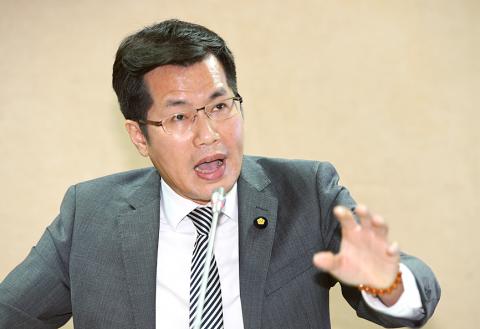Democratic Progressive Party (DPP) legislators have proposed amendments to the Act Governing Relations Between the People of the Taiwan Area and the Mainland Area (臺灣地區與大陸地區人民關係條例) to require former presidents and vice presidents to obtain official approval from the sitting president prior to visiting China.
The amendments were proposed by DPP legislators Lo Chih-cheng (羅致政) and Chen Ting-fei (陳亭妃).
According to the act, all politically appointed former officials with access to national security information are required to obtain approval from the Ministry of the Interior before visiting China in the first three years after their retirement, Lo said.

Photo: Chang Chia-ming, Taipei Times
However, former presidents and vice presidents, who have superiority access to sensitive information, are exempt from the requirements, and “this gap in Taiwan’s national security makes the amendment necessary,” he said.
Chen said the president is the ultimate authority on national defense, diplomacy and cross-strait relations, and there is a need to guard state secrets that flow through the Presidential Office.
The proposed amendments would require former presidents and vice presidents to obtain permission from the sitting president before visiting China and would oblige them to disclose their itinerary and purpose of travel, Chen said.
The proposed measures would protect national security and encourage mutual trust and respect between former and current presidents, Chen added.
Chinese Nationalist Party (KMT) Legislator Alicia Wang (王育敏) opposed the proposed amendments, saying that DPP lawmakers were clearly and improperly targeting President Ma Ying-jeou (馬英九), who is to leave office on May 20.
The proposal lacked “rationality and necessity,” Wang added.
Wang said the proposal undermined the spirit of president-elect Tsai Ing-wen’s (蔡英文) calls for bipartisanship and would create “futile complications” to political cooperation between parties.
Former presidents should be encouraged to contribute to cross-strait relations, and it is “hardly desirable” to limit the ability of “former heads of state” to travel, Wang said.
The incoming administration is unlikely to inherit the KMT government’s good relations with China, and the DPP should consider preserving channels of communication with Beijing, she added.
The DPP should “have more vision” and refrain from taking actions that “solely concern Ma as an individual,” Wang said.

US President Donald Trump yesterday announced sweeping "reciprocal tariffs" on US trading partners, including a 32 percent tax on goods from Taiwan that is set to take effect on Wednesday. At a Rose Garden event, Trump declared a 10 percent baseline tax on imports from all countries, with the White House saying it would take effect on Saturday. Countries with larger trade surpluses with the US would face higher duties beginning on Wednesday, including Taiwan (32 percent), China (34 percent), Japan (24 percent), South Korea (25 percent), Vietnam (46 percent) and Thailand (36 percent). Canada and Mexico, the two largest US trading

AIR SUPPORT: The Ministry of National Defense thanked the US for the delivery, adding that it was an indicator of the White House’s commitment to the Taiwan Relations Act Deputy Minister of National Defense Po Horng-huei (柏鴻輝) and Representative to the US Alexander Yui on Friday attended a delivery ceremony for the first of Taiwan’s long-awaited 66 F-16C/D Block 70 jets at a Lockheed Martin Corp factory in Greenville, South Carolina. “We are so proud to be the global home of the F-16 and to support Taiwan’s air defense capabilities,” US Representative William Timmons wrote on X, alongside a photograph of Taiwanese and US officials at the event. The F-16C/D Block 70 jets Taiwan ordered have the same capabilities as aircraft that had been upgraded to F-16Vs. The batch of Lockheed Martin

GRIDLOCK: The National Fire Agency’s Special Search and Rescue team is on standby to travel to the countries to help out with the rescue effort A powerful earthquake rocked Myanmar and neighboring Thailand yesterday, killing at least three people in Bangkok and burying dozens when a high-rise building under construction collapsed. Footage shared on social media from Myanmar’s second-largest city showed widespread destruction, raising fears that many were trapped under the rubble or killed. The magnitude 7.7 earthquake, with an epicenter near Mandalay in Myanmar, struck at midday and was followed by a strong magnitude 6.4 aftershock. The extent of death, injury and destruction — especially in Myanmar, which is embroiled in a civil war and where information is tightly controlled at the best of times —

China's military today said it began joint army, navy and rocket force exercises around Taiwan to "serve as a stern warning and powerful deterrent against Taiwanese independence," calling President William Lai (賴清德) a "parasite." The exercises come after Lai called Beijing a "foreign hostile force" last month. More than 10 Chinese military ships approached close to Taiwan's 24 nautical mile (44.4km) contiguous zone this morning and Taiwan sent its own warships to respond, two senior Taiwanese officials said. Taiwan has not yet detected any live fire by the Chinese military so far, one of the officials said. The drills took place after US Secretary